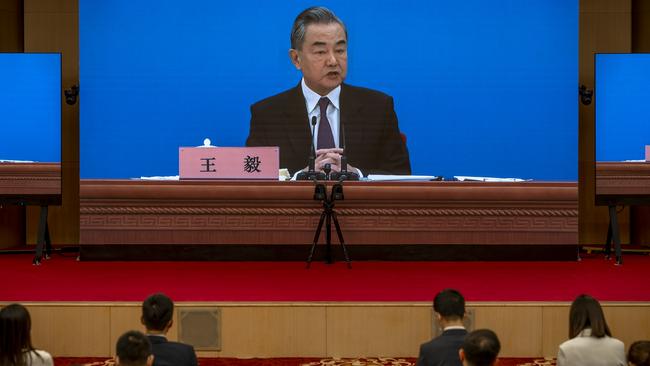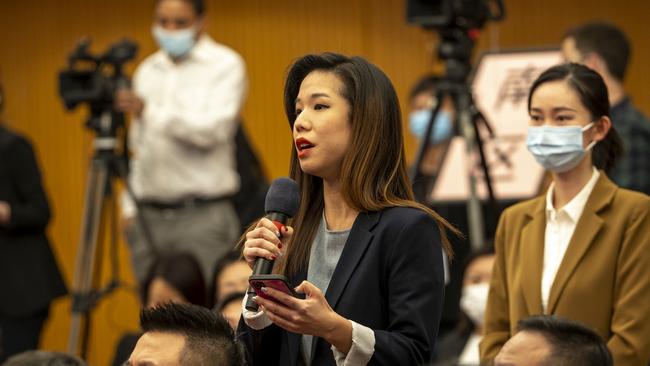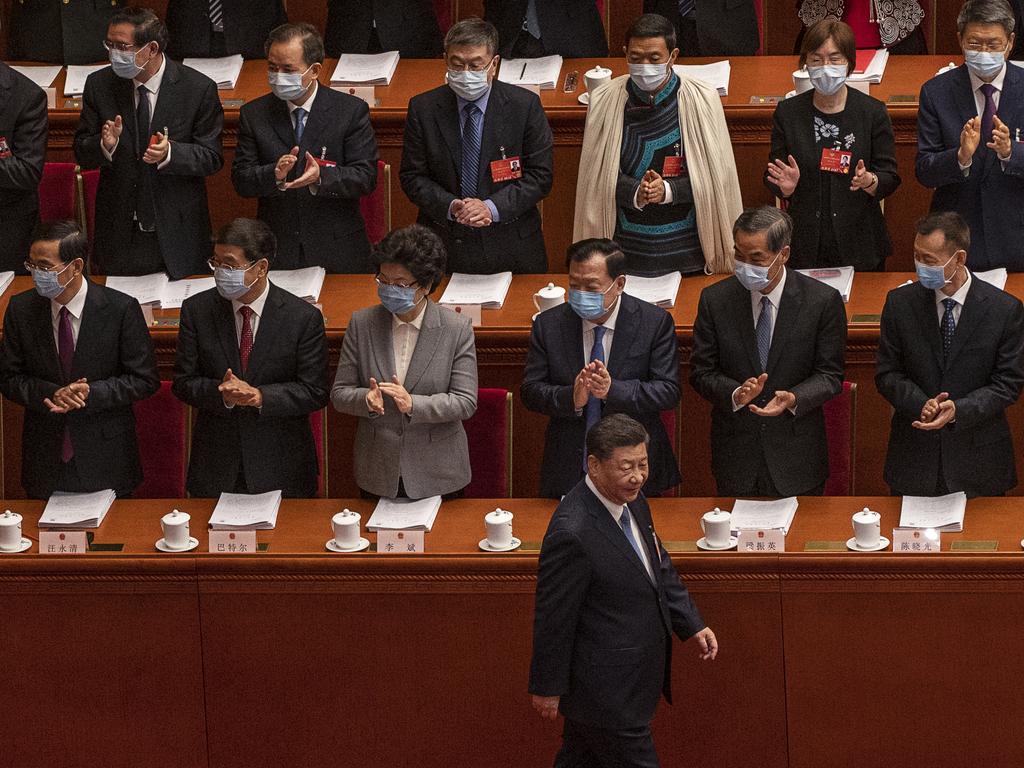China accuses Australia of ‘sinister’ plot
Beijing has cast Australia as the most loyal US accomplice in a plan — dubbed the ‘5432’ posture” — to constrain China’s rise.

Chinese Foreign Minister Wang Yi has cast Australia as the US’s most loyal accomplice in a “sinister” strategy to constrain the rising power with an “Indo-Pacific version of NATO”.
Without naming Australia directly, Mr Wang outlined Canberra’s role as an “acolyte” in what he dubbed Washington’s “5432 posture”.
“(The US) talks about multilateralism but in reality it creates exclusive clubs,” Mr Wang said on Monday night on the sidelines of the National People’s Congress, China’s rubberstamp parliament.
“It claims international rules but in reality it is setting and imposing rules suiting itself and its acolytes. From strengthening the Five Eyes and peddling the Quad to putting together the AUKUS security partnership and tightening bilateral military alliances, the US is staging a ‘5432’ posture in the Asia-Pacific.
“It is by no means a blessing but a sinister move. The real goal for the Indo-Pacific strategy is to establish an Indo-Pacific version of NATO … These perverse actions run counter to common aspirations of the region and are doomed to fail.”
Mr Wang’s prepared remarks on the US’s Indo-Pacific strategy underline the breadth of the security issues that have sunk the Australia-China relationship to a 50-year low.
Australia is the only country, other than the US, to be in every one of the groups the Chinese Foreign Minister said were “stoking regional rivalry”. Membership in all of them has bipartisan support in Canberra.

Rory Medcalf, head of the National Security College at the Australian National University, said the comments revealed “a certain frustration in the Chinese system”.
“If the last five years have proven anything, it’s that it is going to be futile to try to break Australia away from the US-led alliance system,” Professor Medcalf told The Australian.
“We’re more firmly and bipartisanly embedded in that than we’ve ever been.”
The strident comments from Beijing underline the limitations on China’s new ambassador in Canberra, Xiao Qian, who has said he wants to improve the fractious bilateral relationship.
On arrival in Australia in late January, Chinese President Xi Jinping’s top envoy in Australia said he wanted the two countries to “look into the future” and “meet each other halfway”.
Over the past fortnight, Mr Xiao has met separately in Canberra with iron ore billionaire Andrew Forrest, former foreign minister Julie Bishop (in her role as chancellor of the Australian National University), the Business Council of Australia’s China head Warwick Smith and Australia China Business Council president David Olsson.
The Australian has been told Mr Xiao was “highly professional” in those meetings. His diplomatic efforts, however, were offset by a People’s Liberation Navy vessel that shot a laser at an Australian plane and China’s tacit support for Russian President Vladimir Putin’s invasion of Ukraine.
Mr Wang’s comments were made at an annual televised press conference, which Beijing uses to set markers on key foreign policy issues during the National People’s Congress.
In other prepared answers, Mr Wang again refused to condemn Mr Putin’s invasion of Ukraine, said China’s relationship with Russia remained “rock solid”, blamed the US for not addressing North Korea’s “legitimate security concerns” and said Washington was the cause of tension in the Taiwan Strait.
“In order to contain China’s revitalisation, some forces in the United States connive in the development of ‘Taiwan independence’ forces,” Mr Wang said.
He warned this was pushing Taiwan into a “dangerous situation”, which he said would “bring unbearable consequences to the US side”.
Xu Shanpin, a researcher on international relations at Xiangtan University, said Mr Wang’s comments were the first time the “5432” formula had been publicly used by China’s government.
Mr Xu said Canberra’s involvement in Five Eyes, the Quad and AUKUS helped to “amplify” its influence in the region and “uplift its strategic importance”.
“On the other hand, it will increase strategic risks and pressures facing Australia, exposing Australia to the very frontline of confrontation,” he said.
Peter Jennings, the outgoing head of the Australian Strategic Policy Institute, told said it was “clear that AUKUS and the Quad really gets under the skin of senior Chinese officials”.
“And to me that shows how valuable these new alliances are,” Mr Jennings said.
”China knows it struggles to make friends anywhere other than fellow one party states.”
“But the democracies are able to form these types of arrangements and I think it does run counter to China’s aims for the region but that’s what makes it worthwhile.”
Mr Jennings said it was “entirely in China‘s hands” as to whether the security architecture in the region came to resemble an Indo-Pacific version of NATO.
“At the moment, that‘s not in prospect,” he said. “The only thing that could make it happen is if China continues to be the aggressor in the region. And then in time I think you will see more NATO-like features.”
Mr Wang’s comments on the “5432” posture were in answer to a vetted question submitted in advance by the Singaporean Chinese newspaper Lianhe Zaobao. The paper was involved in an orchestrated proof-of-life interview with Chinese player Peng Shuai in December.
All journalists at the Beijing press conference had to gain approval from China’s Foreign Ministry, submit questions in advance, spend Sunday night in the hotel at which the event was held and receive a negative Covid-19 test.
Mr Wang did not attend in person, but appeared on a television screen.
Additional reporting: Joe Kelly







To join the conversation, please log in. Don't have an account? Register
Join the conversation, you are commenting as Logout